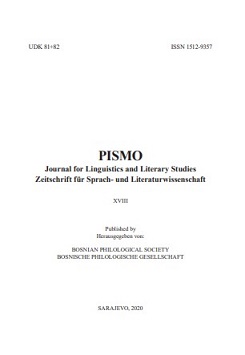Deverbalni sufiksi I, -gA, -gI u turskom jeziku
Deverbal Suffixes I, gA, gI in Turkish
Author(s): Rijana JusufbegovićSubject(s): Morphology, Syntax, Lexis, Turkic languages
Published by: Bosansko filološko društvo
Keywords: Turkish language; deverbal suffixes; word formation; vowel harmony;
Summary/Abstract: This paper analyses examples of Turkish nouns and adjectives derived from verbs by using different denominational suffixes, such as suffixes ( lı, -li, -lu, -lü) and ( sız, siz, suz, süz), on nouns previously derived by deverbal suffixes -I (-ı, -i, u, ü), -gA (-ga, -ge) and -gI (-ı, - and, u, ü). It illuminates the wide range of possibilities of deriving new words that characterizes Turkish as an agglutinative language. Suffixation is imposed as a special kind of conceptualization of reality through the addition of a certain type of suffixes even to words whose meaning is formed by some other type of suffixes. Although his paper deals with suffixes that, according to modern Turkish grammarians, were also present in the early stages of Turkish literacy, it points out that the possibility of suffixal conceptualization, as a feature of Turkish and similar agglutinative languages, makes even old suffixes quite productive in modern language, including spoken Turkish language in the Republic of Turkey.
Journal: Pismo - Časopis za jezik i književnost
- Issue Year: 2020
- Issue No: 18
- Page Range: 45-53
- Page Count: 9
- Language: Bosnian

